B4U1导学案
N302思维数学导学案-B4第一单元导学案(2)
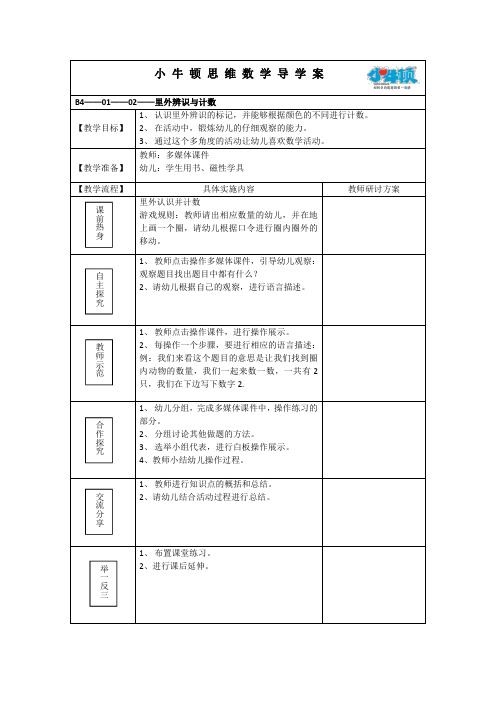
具体实施内容 里外认识并计数 游戏规则:教师请出相应数量的幼儿,并在地 上画一个圈,请幼儿根据口令进行圈内圈外的 移动。
1、 教师点击操作多媒体课件,引导幼儿观察:
自 主
观察题目找出题目中都有什么?
探
2、请幼儿根据自己的观察,进行语言描述。
究
教师研讨方案
1、 教师点击操作课件,进行操作展示。
教 师
2、 每操作一个步骤,要进行相应的语言描述:
流
2、请幼儿结合活动过程进行总结。
分
享
1、 布置课堂练习。举 一2、进行课后源自伸。反三示
例:我们来看这个题目的意思是让我们找到圈
范
内动物的数量,我们一起来数一数,一共有 2
只,我们在下边写下数字 2.
1、 幼儿分组,完成多媒体课件中,操作练习的
合
部分。
作
探
2、 分组讨论其他做题的方法。
究
3、 选举小组代表,进行白板操作展示。
4、教师小结幼儿操作过程。
交
1、 教师进行知识点的概括和总结。
小牛顿思维数学导学案
B4——01——02——里外辨识与计数 1、 认识里外辨识的标记,并能够根据颜色的不同进行计数。
【教学目标】 2、 在活动中,锻炼幼儿的仔细观察的能力。 3、 通过这个多角度的活动让幼儿喜欢数学活动。 教师:多媒体课件
【教学准备】 幼儿:学生用书、磁性学具
【教学流程】
课 前 热 身
大学英语第三版B4U1教案
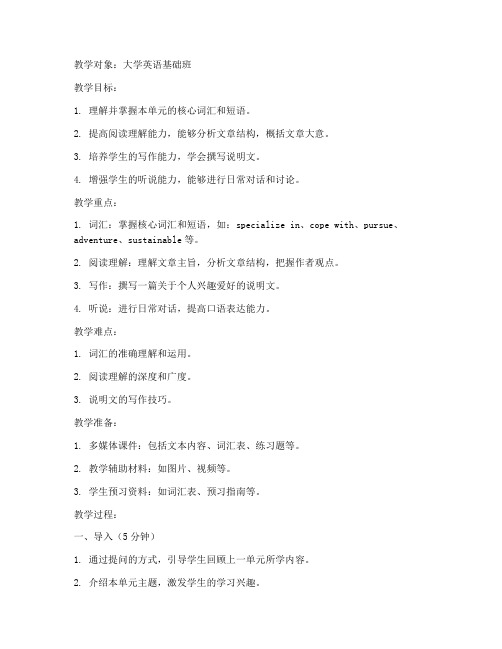
教学对象:大学英语基础班教学目标:1. 理解并掌握本单元的核心词汇和短语。
2. 提高阅读理解能力,能够分析文章结构,概括文章大意。
3. 培养学生的写作能力,学会撰写说明文。
4. 增强学生的听说能力,能够进行日常对话和讨论。
教学重点:1. 词汇:掌握核心词汇和短语,如:specialize in、cope with、pursue、adventure、sustainable等。
2. 阅读理解:理解文章主旨,分析文章结构,把握作者观点。
3. 写作:撰写一篇关于个人兴趣爱好的说明文。
4. 听说:进行日常对话,提高口语表达能力。
教学难点:1. 词汇的准确理解和运用。
2. 阅读理解的深度和广度。
3. 说明文的写作技巧。
教学准备:1. 多媒体课件:包括文本内容、词汇表、练习题等。
2. 教学辅助材料:如图片、视频等。
3. 学生预习资料:如词汇表、预习指南等。
教学过程:一、导入(5分钟)1. 通过提问的方式,引导学生回顾上一单元所学内容。
2. 介绍本单元主题,激发学生的学习兴趣。
二、词汇学习(15分钟)1. 介绍本单元核心词汇和短语,如:specialize in、cope with、pursue、adventure、sustainable等。
2. 通过例句和练习,帮助学生掌握词汇的用法。
3. 引导学生进行词汇卡片制作,巩固记忆。
三、阅读理解(25分钟)1. 介绍文章结构,引导学生分析文章段落大意。
2. 阅读全文,概括文章主旨,把握作者观点。
3. 进行段落大意、主旨大意等练习,提高学生的阅读理解能力。
四、写作训练(15分钟)1. 引导学生思考个人兴趣爱好,确定写作主题。
2. 讲解说明文的写作技巧,如:引言、正文、结论等。
3. 学生根据所学内容,撰写一篇关于个人兴趣爱好的说明文。
五、听说训练(15分钟)1. 组织学生进行日常对话,如:介绍个人兴趣爱好、询问对方爱好等。
2. 学生分组进行讨论,分享个人兴趣爱好,并讨论如何培养兴趣。
北师大版四年级语文下册导学案全册表格式教案

小学语文四年级下册第一单元导学案第一单元话语单元说明:本单元编排了四篇课文,分为一首诗歌和三篇记叙文。
记叙文中有一篇中国历史故事,两篇外国故事。
《大地的话》歌颂了大地母亲博大,无私的情怀,《语言的魅力》体现了有魅力语言的重大作用。
《秉笔直书》表现出史官们公正不阿,秉笔直言的求真精神。
教学要点:1、正确、流利有感情的朗读课文。
2、继续练习标画出重点词句,练习用学过的方法品词品句。
3、练习在自读时用“是什么”“怎么样”“为什么”提出有价值的问题4、理解部分新词在课文中的意思5、认识25个字,写字20个,继续练习写摘录笔记6、仿写句子设计方案:第一步:教学《大地的话》学习强调朗读语气的方法。
第二步:教学《语言的魅力》完成日积月累中的仿写句子。
第三步:教学《秉笔直书》。
指导质疑和体会重点词句的意思。
第四步:交流习作,复习检查教学时数:8课时小学语文四年级下册第一单元导学案主备人:程少华审核人:孙丹训练主题:话语小学语文四年级下册第一单元导学案小学语文四年级下册第一单元导学案主备人:柳艳审核人:孙丹程少华训练主题:话语小学语文四年级下册第一单元导学案主备人:柳燕审核人:程少华孙丹训练主题:话语小学语文四年级下册第一单元导学案小学语文四年级下册第一单元导学案1、预习检测(5分钟)A、听写语:)2、交流协作(15钟)a、太史的职责是什么?b、他们是怎样做的?(画出重点语句)c、他们为什么这样做?B、我能找出人物神态变化的语句,并从中体会人物的内心活动。
C、我在小组内交流自己解决的问题,并取长补短、共同进步。
3、展示激励(10分钟)【导学:相信你能体会课文人物的心情,并完整表达自身感悟】A、朗读展示:我选择自己喜欢的人物,抓住相关的语句有感情地朗读;B、我想夸夸这几位史官。
4、深入引领(5分钟)【导学:希望大胆发言,仔细倾听】A、我能用一些词来概括出这几位史官的品质。
B、如果我穿越到古代,做一名“史官”,我会这样做:()5、巩固拓展(5分钟)【导学:希望你认真答题,收获知识成果】A、深入理解课文,我真正了解了“秉笔直书”的意思。
新视野大学英语第三版B4U1教案
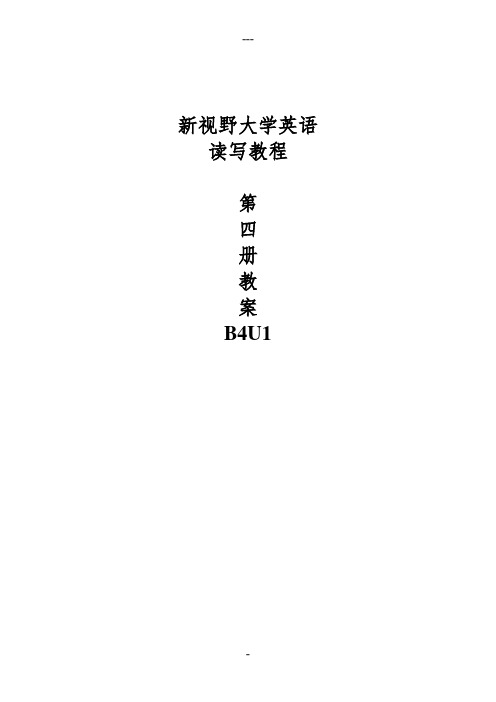
新视野大学英语读写教程第四册教案B4U1Unit 1Life and Logic*Teaching Objectives:Students will learn to use English to1.To practice the skimming and scanning reading skills2.To apply the phrases and patterns3.To master the writing pattern of a narrative essay4.To write an essay creatively based on the understanding of the text*Time Allotment: each unit 8 classes1st---2nd classes: Part I Warming up1.Lead-in :2.Understanding of the text: Detailed understanding focusincluding Topic Sentence, Key Words, Logic Words, Reading Clues etc. in order to help students have a better understanding about the passage by asking some questions about it.3rd--4th classes:Part II Text Study3.Reading in Depth: Structure Analysis, Summary, Difficult sentences analysisnguage Focus: More practice in Language Points (language points explanation,Sentence Patterns, Useful Expressions)5th—6th classes:Part III Reflection5.Critical thinking: More speaking practice in discussion related to love and logic6.Writing Practice: Text writing• My first meeting with my roommate• My most embarrassing experience• A time I felt most proud of myself7th—8th classes: Part IV Assignment7. Post-reading activities: review words and expressions, role-play, exercises, etc8. Section B: Focus on fast reading and Practice in reading skillUNIT 1Section A Love and Logic: The Story of a FallacyPart I Warming up1. Lead-in:1) What do you know about logic?Tips:·It is the use and study of valid reasoning;·Most prominent in the subjects of philosophy, mathematics, and computerscience;·Established as a formal discipline by Aristotle;·One of the classical trivium (三学科), the other two being grammar and rhetoric (修辞);·Divided into three parts: inductive reasoning(归纳推理), abductive reasoning (反绎推理), and deductive reasoning(演绎推理).2) Do you think it is possible to deal with life in a completely rational and logical way?Tips:·When it comes to making a choice, many people tend to use rational and logical reasoning;·Rational world is not necessarily a wonderful one;·Rational individuals can make choices that are bad news for others;·It is ridiculous to deal with love in a logical way.3) The following are some statements to test your reasoning ability. Tell whetherthe conclusions after the word “Therefore”are true (T), false (F), or uncertain (U). Write your answer on the line before each statement.1. All odd numbers are integers (整数). All even numbers are integers. Therefore, all odd numbers are even numbers.2. There are no dancers that aren’t slim and no singers that aren’t dancers. Therefore, all singers are slim.3. A toothpick (牙签) is useful. Useful things are valuable. Therefore, a toothpick is valuable.4. Three pencils cost the same as two erasers. Four erasers cost the same as one ruler. Therefore, pencils are more expensive than rulers.5. Class A has a higher enrollment than Class B. Class C has a lower enrollment than Class B. Therefore, Class A has a lower enrollment than Class C.2. Cultural Background:1) What is a fallacy? And how is it used?Tips:·An error in reasoning that renders an argument logically invalid;·By accident or design, logical fallacies are often used in debate or propaganda;·To mislead people;·To distract people from the real issue for the purpose of winning an argument.2) How many types of fallacy do you know?Tips:Part II Text Study1. Global Reading:Tips for Reading: A Good Reader should1) Try to become an active reader.2) Learn to ask more questions. ( what, why, how)3) Do the efficient reading. (key points, topic sentence, key words, locatingwords, necessary and sufficient )4) Develop a habit of marking during reading.1.1 Answer Questions1) Why does the narrator want to have a beautiful and well-spoken girlfriend?Tips: He thinks a beautiful and well-spoken girlfriend will assist him to land a job and achieve success in an elite law company.2) Why does the narrator decide to teach Polly logic?Tips: Because he believes logic is essential to critical thinking. By teaching Polly logic, he can make her intelligent and well-spoken.3) Is the narrator successful in teaching Polly logic? How do you know?Tips: Yes. He is only too successful in teaching her because in the end when he asks Polly to be his girlfriend, Polly refuses his request by applying all the logical fallacies he has taught her.1.2 Structure Analysis:The text tells a humorous but ironic story. The narrator, a smart and promisingyoung student in a law school who seems to be able to attract beautiful girls easily, ends up in failure in his efforts to win a girl.Text A is a narrative, the focus of which is the plot. The structure of a narrative essay usually follows the Introduction –Body –Conclusion format.1.3 SummaryMy roommate Rob made a pact with me that he’d give me his girlfriend Polly in exchange for my jacket. And I agreed.Polly had the right background to be the girlfriend of a dogged, brilliant lawyer like myself. She was pretty, well-off, and radiant. Still, I want to dispense her enough pearls of wisdom to make her “well-spoken”.So I tried my best to teach her such logical fallacies as Dicto Simpliciter, Hasty Generalization, Ad Misericordiam, and False Analogy. After five nights of diligent work, I actually made a logician out of Polly. She was an analytical thinker at last. When I asked her to develop our relationship into a romantic one, however, she refuted my arguments as those logical fallacies I had taught her! And she refused my proposition by making full proposition: She liked Rob in leather, therefore, she had told him to make the pact with me so that Rob could have my jacket.为了给后代换来一个和平的环境,我们的革命先烈们抛头颅、洒热血。
北师大版小学四年级数学上册导学案教案 全册
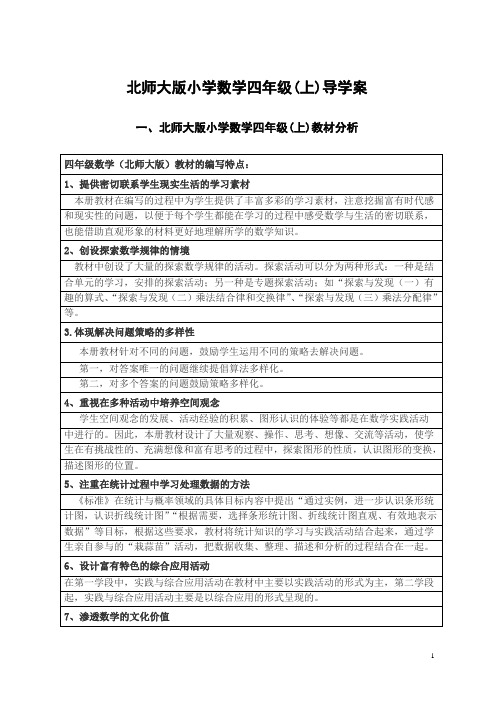
北师大版小学数学四年级(上)导学案一、北师大版小学数学四年级(上)教材分析二、学生学习情况分析、择优促差措施第一单元测试卷(3课时)班级_______姓名_______分数_______一、请读出下列数字。
234588919 读作:____________________________________376009704 读作:____________________________________6030607080 读作:____________________________________800000004 读作:____________________________________90990900008 读作:____________________________________57080023040 读作:____________________________________二、请写出下列数字。
一千零四亿三千零一万写作:____________________________________六千七百亿零三千五百零四写作:____________________________________二千二百零三万八千写作:____________________________________八亿零七写作:____________________________________二千五百四十六亿七千零五十二万六千四百八十五写作:___________________六百亿零四万零四写作:____________________________________三、请将下列数改写成“亿”、“万”作单位的数。
540000=()万 352000000=()万90500000000=()亿 53680000=()万235728≈()万 629999≈()万890080000≈()亿 12350000≈()亿4090000=409() 1250000000=()亿四、填空。
B4U1-21世纪大学英语四册1单元教案

教学目标:1. 让学生掌握本单元生词和短语;2. 培养学生阅读理解能力,提高阅读速度;3. 培养学生听说能力,提高口语表达能力;4. 培养学生批判性思维能力,学会从不同角度分析问题。
教学重点:1. 生词和短语;2. 阅读理解;3. 口语表达。
教学难点:1. 生词和短语的理解和应用;2. 阅读理解中的推理和判断;3. 口语表达中的语法和词汇运用。
教学过程:一、导入1. 引导学生回顾上节课所学内容;2. 通过提问,激发学生对本节课的兴趣。
二、课文讲解1. 介绍课文背景,让学生了解作者和文章主题;2. 分段讲解课文,讲解过程中注意生词和短语;3. 引导学生分析课文中的语法和结构;4. 针对课文中的难点进行讲解,如推理、判断等。
三、阅读理解1. 学生阅读课文,完成课后练习题;2. 教师讲解练习题,引导学生分析答案;3. 对课文中的重点段落进行深入讲解,帮助学生理解文章主旨。
四、口语表达1. 学生进行小组讨论,围绕课文主题展开;2. 学生代表小组进行发言,锻炼口语表达能力;3. 教师对学生的发言进行点评,指出优点和不足。
五、总结1. 总结本节课所学内容,强调重点和难点;2. 布置课后作业,巩固所学知识。
教学反思:1. 本节课通过讲解课文、阅读理解、口语表达等环节,让学生全面掌握本单元的知识点;2. 在讲解过程中,注重启发学生思考,提高学生的批判性思维能力;3. 通过小组讨论和口语表达,锻炼学生的口语表达能力;4. 在课后作业的布置上,注重巩固所学知识,提高学生的实际应用能力。
教学评价:1. 学生对本节课的学习兴趣浓厚,积极参与课堂活动;2. 学生能够较好地掌握本单元的生词和短语;3. 学生的阅读理解能力和口语表达能力有所提高;4. 学生在课后能够主动复习所学知识,巩固学习成果。
新外研版八年级下M4U1导学案

课题:Module 4 Seeing the doctorUnit 1 I have n’t done much exercise since I got my computer 班级:姓名:学号:【学习目标】1.知识目标:1、掌握本单元的词汇、短语以及句型。
()单词:cough fever headache stomach ill since catch a cold take sb’s temperature fast food health短语:英语周报第24期B2版UNIT1课时学案知识清单的短语。
句型:交际用语:1. How can I help you ?2. No, not usually.3. That’s the problem !4. Not really.2.能力目标:1.能够听懂疾病及症状的描述并提取相关信息。
()2. 能够听懂关于健康生活习惯的表述并提取细节信息。
()3. 能够与同学合作完成医患间的角色扮演,谈论疾病及治疗办法。
()学习过程:第一课时【预习指导与检测】熟记Unit 1的新单词和短语,完成《同步》第25页Unit 1 “自主学习”部分,并把这些短语在书上画出来【课堂导学与互动】1、看图,根据人物的动作和表情将单词连线并排序,学习引入新单词。
2、课本Activity2,听录音,找出Betty和 Daming得了什么病。
3、Activity3,听短文,完成27页的表格。
4、再听一次课文,用正确的单词或短语填空。
(课本27页Activity4)5、跟读课文然后小组合作,分角色朗读对话。
6、朗读Activity5,注意语调。
7、总结提升:M4U1的单词,短语和句型。
【课堂反馈小测】共50分A. 根据句意及首字母提示补全句中所缺单词。
1. “I have a pain in the head.” means “I have got a h________.”2. Jenny’s temperature is higher than usual. She may have a f________.3. I haven’t seen h im s________ last month.4. My grandmother often c________ a lot at night and she almost can’t sleep.5. Linda was i________ yesterday, so she didn’t go to work.B. 根据句意从方框中选出恰当的短语填空,有的需要变换形式,每个短语限用一次。
北师大版小学四年级语文上册导学案全集
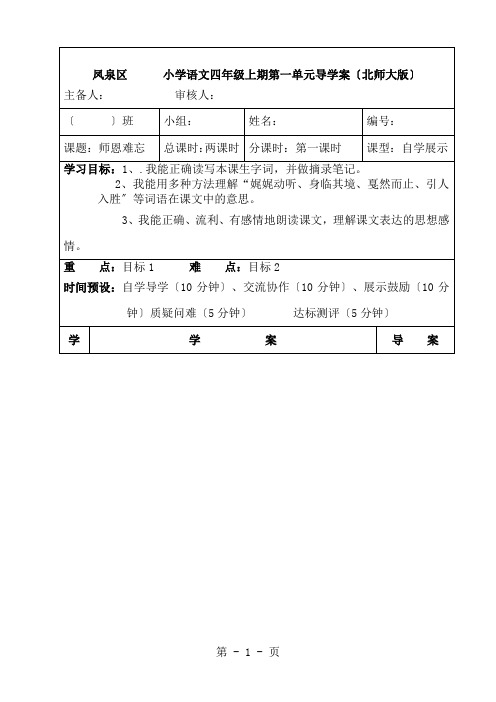
一、复习检测〔5分钟〕组内复习生字词。
二、交流协作〔10分钟〕1、各小组出示组内制作的生字卡片,随机抽一组学生读生字卡片。
2、我能为大家领读课文。
3、群学:为什么诗中很多句子读起来特别美?三、展示鼓励〔10分钟〕1、我能展示生字的书写方法,知道书写生字时应注意的问题。
2、我能上黑板范写。
3、我要再练写一遍,我要当“小小书法家〞。
4、我又发现了新的问题:读二至四节的开头,我发现了。
四、拓展延伸〔10分钟〕1、我能说出,为什么“我〞的集邮册是“美丽〞。
2、我也有集邮的爱好,我要把我最喜欢的邮票介绍给大家。
3、读了课文,我要写出我的感受:。
五、达标测评〔5分钟〕1、先说一说,为什么“我〞的集邮册是“美丽〞,然后把说的话写在笔记本上。
2、我能把下面的对偶句补充完整。
有心栽花花不开,。
黑发不知勤学早,。
集邮看方寸世界,。
一、自学导学〔10分钟〕1、我要自读课文,把生字圈出来,把句子读通顺。
2、读课文时,我要把有疑惑的地方做记号。
二、交流协作〔10分钟〕1、交流检查生字:携带参谋揭下捐献慰问图稿防止益处提供抵偿2、学生交流各自的问题。
三、展示鼓励〔15分钟〕1、从课文中选出好词、好句,做摘录笔记,在班内展示。
2、提出阅读中存在的问题,寻求最好解决途径。
四、达标测评〔5分钟〕1 选择正确的读音提供〔ɡōnɡɡònɡ〕参谋〔mào móu 〕琢磨〔 zhuó zuó〕秦俑〔yōnɡ yǒnɡ〕 2 选词填空。
采用采取采纳班主任〔〕了同学们的意见。
罗斯福〔〕了普及集邮的许多措施。
我们的书本是〔〕再生纸浆制造出来的。
歌颂赞扬赞美美丽的集邮册〔〕了伟大的祖国。
游客禁不住〔〕江南秀美的风光。
老实守信的行为应该得到〔〕。
一、复习检测〔5分钟〕1、组内复习生字词。
二、交流协作〔10分钟〕1、我收集到了有关罗斯福先生的资料。
2、我知道罗斯福为什么会对集邮产生这样大的兴趣呢?我要谈谈自己的想法。
新标准大学英语4B4U1教(学)案
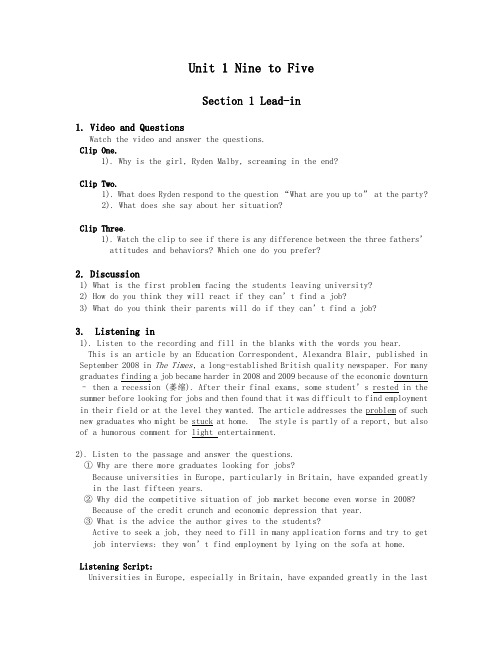
Unit 1 Nine to FiveSection 1 Lead-in1.Video and QuestionsWatch the video and answer the questions.Clip One.1). Why is the girl, Ryden Malby, screaming in the end?Clip Two.1). What does Ryden respond to the question “What are you up to” at the party?2). What does she say about her situation?Clip Three.1). Watch the clip to see if there is any difference between the three fathers’attitudes and behaviors? Which one do you prefer?2.Discussion1) What is the first problem facing the students leaving university?2) How do you think they will react if they can’t find a job?3) What do you think their parents will do if they can’t find a job?3. Listening in1). Listen to the recording and fill in the blanks with the words you hear.This is an article by an Education Correspondent, Alexandra Blair, published in September 2008 in The Times, a long-established British quality newspaper. For many graduates finding a job became harder in 2008 and 2009 because of the economic downturn – then a recession (萎缩). After their final exams, some student’s rested in the summer before looking for jobs and then found that it was difficult to find employment in their field or at the level they wanted. The article addresses the problem of such new graduates who might be stuck at home. The style is partly of a report, but also of a humorous comment for light entertainment.2). Listen to the passage and answer the questions.① Why are there more graduates looking for jobs?Because universities in Europe, particularly in Britain, have expanded greatly in the last fifteen years.② Why did the competitive situation of job market become even worse in 2008?Because of the credit crunch and economic depression that year.③ What is the advice the author gives to t he students?Active to seek a job, they need to fill in many application forms and try to get job interviews: they won’t find employment by lying on the sofa at home.Listening Script:Universities in Europe, especially in Britain, have expanded greatly in the lastfifteen years, so there are more graduates looking for jobs. This competitive situation became a lot worse in 2008 onwards with the credit crunch and economic depression, which means that there were fewer jobs available and a rise in unemployment. Thus new graduates have to be active to seek a job, they need to fill in many application forms and try to get job interviews: they won’t find employment by lying on the sofa at home.Section 2 Passage Learning1.Background informationCultural Note: Honors Degree1)Most people get a second.2)Traditionally, in the British university system, BA (文学学士) and BS (理学学士) are awarded in different categories: a first class degree (I), a second (IIi or IIii called “a two one” and “a two two”), a third (written III) anda pass degree.3)There are also ordinary degrees with more general courses of study without thesecategories.Key: 2,1,3Generation Y and Grunt1). Work in pairs and answer the question. How to name the generations and characterize them?2). Why is Generation Y is also called Generation Grunt?Complete the passage with the words in the box.express children available experienceIt is an ironic name referring to repetitive, low status, routine or mindless work – this may be the only work available to some graduates, who may have to take very ordinary jobs to get experience .“Grunt” also refers to coarse behavior or bad manners and to the deep sound that is made by a pig. When people “grunt” they express disgust but do not communicate with words – this may be how the parents of new graduates think their children communicate with them!2.Text organizationGeneral structure:Problems after graduation↓Advice for dealing with the problemsDetailed structure:↓viewpoints↗ ↗ ↖ ↖parents(Paras 1-2) author(Para 3) graduates (Paras 4-6) mother(Paras 7-9)Psychotherapi← author(Para 16)(Paras 10-15)↓ ↓Parents’ balance:positive → not making More exampleslife too comfortable↓Better for fathersto help boys after a job setback.↓It’s a good idea toget some jobs like bar work, shelf-stacking.rmation analysisWork in pairs. Look at the sentences and discuss the implied meanings unsaid. 1)“Will he ever get a job?” Who is asking this qu estion? What mood does it express?The parents are asking the question.The mood seems to express patience or resignation because the word “ever”suggests that getting a job will take a long time.2)Who describes Generation Y as “rebels without a cause”? I s it a fair description?This is the writer’s description to indicate that this generation is rebelling against parents or society, but they have nothing particular to rebel against.This does not seem very fair because the students are trying to find work – it is just that they don’t like their parents nagging them.3)[Jack] “walked into the university careers service and straight back out again”.What does this suggest about Jack’s character?It suggests that Jack is not very determined. As soon as he saw the queue he left without waiting and without trying to ask about jobs or careers.4)Jack spent the summer “hiding”.Hiding from what? Why are quotation marks used?Hiding from the world of work, staying at home and not looking for a job.The quotation marks tell us that he wasn’t literally hiding, he just spent a lot of time at home.5)How is Mrs. Goodwin’s point of view affected by her own personal experience?In one way her experience hasn’t affected her attitude. She left school and went immediately to a job (without going to university) and has been working full-time since then and yet she is sympathetic and takes a soft line.6)How is Lindenfield’s point of view affected by her own personal experiences?Her personal experience was that she worked in a bar before finding her first proper job as an aerial photographic assistant. So she says such work is a great networking opportunity. If new graduates are good at such work and bright, cheerful and polite, they will soon be promoted. Her personal experience thus reflects – or perhaps has created – her point of view.7)What would the first two paragraphs have focused on if they had been presented from the point of view of the students rather than the parents?The first two paragraphs would have focused on the need for the new graduates to rest for a bit after their hard studies. It is OK for students to relax with the TV or to socialize with friends for a while, then they can start a serious search for employment after that.4.Theme Discussion1) Do you think the Goodwins are good parents?Yes. If they take a hard line with Jack, it will just make him angry: He has already tried to find work and he needs rest and sympathy now. His parents are letting him go to South America. But after that he will have to make a more serious effort and he’ll need to contribute to the h ousehold budget, which means he must find work then. So the soft line is the best approach.No, their soft line is not good enough. They should insist that he make more effort and they should actively help him to find work, even a temporary job. Their soft approach just encourages him to delay and by the time he comes back from his holiday all the likely jobs will have been taken. So they are not really helping at all.How can they let him take a three week holiday abroad when he hasn’t got a job to come back.2) Which advice Lindenfield gives to parents do you agree with (if any), and why?I agree with her advice that parents should strike the right balance between beingpositive and understanding without making life too comfortable, otherwise students will not look for a job. Her advice about working in a bar or supermarket seems sensible too, because one job can lead to another.3 )Is Jack’s point of view that he doesn’t want to do temporary bar work justifiable?No. He thinks that kind of work is a dead-end job and not suitable for him. But he’s wrong because he has the wrong attitude toward work. A new graduate may expect to start at the bottom: That’s OK while you get experience. If you have a good attitude and work well, you will soon be promoted or you can find a much better job later. He’s unrealistic, I think.4) Do you agree that men can give boys better advice than women when they are stuck in setbacks? Why / Why not?Yes. Men will understand the male point of view better and conversely women will understand a female point of view better. So each gender will give the best advice to someone of their own gender.No, to understand setbacks in the search for work is not a gender issue. I think anyone who knows the situation can give good advice, whether they are male or female.5)Do you think the passage is a fair overview of the problem of graduate unemployment?No, because there is no mention of those who persistently apply for many jobs but don’t get interviews or offers of employment. The article seems to suggest that new graduates sit around at home, but I know many people who really search hard for work. Some find it, some don’t. It’s easy to say that this is a matter of luck, it is a matter of having a positive attitude and being flexible about the first job – you can always change your field of work later.5.SummaryListen to the passage and fill in the blanks with the words you hear.This text is a newspaper article with individual examples of job searching and problems after graduation. The problems are examined from different people’s viewpoints: paren ts’ attitudes towards their jobless children, students’ quote about looking for jobs, psychologists’ summery of the viewpoints of parents and advice for dealing with the problems, and the author’s own comments. In the end the author concludes that if the graduates cannot find an ideal job, they can takea temporary one.6.Language pointsDifficult sentences1.Those memories of forking out thousands of pounds a year so that he could eat welland go to the odd party, began to fade. (Para 1)2. I passed the exams, but at the interviews they accused me of being ‘too detached’and talking in language that was ‘too technocratic’, which I didn’t think possible, but obviously it is. (Para 5)3. I went to a comprehensive and I worked my backside off to go to the good university, … (Para 6)4. Carry on life as normal and don’t al low them to abuse your bank account or sapyour reserve of emotional energy. (Para 11)5. After that the son or daughter needs to be nudged firmly back into the saddle. (Para 12)Words to note:1. revert2. comprehensive3. proceed4. transitionPhrases:1. in the same boat2. come full circle3. take a soft/hard line4. strike the right noteUseful expressions:Section 3 ExercisesInstructionsCompulsory Work:1. Learn all the new words and expressions of this unit (Vocabulary Handbook).2. Complete Ex. 3-7 on P5-6. (Ex. 3-4 should be finished when students preview the text.)3. Read the passage in “Active reading (2)” after class and finish Ex. 4-7 on P9.4. Read the passage in “Reading across cultures” after class and finish Ex. 1 on P14.5. Finish “Language in Use” on P12-13.Compulsory Work:1. Learn all the new words and expressions of this unit (Vocabulary Handbook).2. Complete Ex. 3-7 on P5-6. (Ex. 3-4 should be finished when students preview the text.)3. Read the pas sage in “Active reading (2)” after class and finish Ex. 4-7 on P9.4. Read the passage in “Reading across cultures” after class and finish Ex. 1 on P14.5. Finish “Language in Use” on P12-13.Keys – Active reading (1) (P4)Reading and understanding2. Choose the best answer to the questions.1. c2. b3. a4. c5. c6. dDealing with unfamiliar words: 31. proceed2. transition3. detached4. upcoming5. slump6. revert7. recountDealing with unfamiliar words: 41. transition2. slumped3. proceed4. recounting5. detached6. upcoming7. revertDealing with unfamiliar words: 51. comprehensive2. cop3. aerial4. clutched5. advocate6. healedDealing with unfamiliar words: 61. b2. a3. a4. a5. bDealing with unfamiliar words: 71. b2. b3. a4. a5. a6. a7. a8. aKeys – Active reading (2) (P9)Reading and understanding2. Choose the best answer to the questions.1. a2. d3. a4. b5. c6. cDealing with unfamiliar words: 41. amusing2. fortunately3. loan4. deduct5. highlight6. sympathize7. demandingDealing with unfamiliar words: 51. sympathize2. fortunately3. loan4. demanding5. amusing6. highlight7. deductedDealing with unfamiliar words: 61. belongings2. dropouts3. gamble4. exceeded5. odds6. thriving7. honestyDealing with unfamiliar words: 71. b2. b3. a4. a5. b6. a7. a8. a9. aKeys – Language in use (P12)1. word formation: compound nounsLook at the sentences from the passage Looking for a job after university? First, getoff the sofa.… proudly clutched his honors degree for his graduation photo.I don't want to do bar work.Paying for career consultations, train fares to interviews or books …It's a great antidote to graduate apathy.Now write the compound nouns which mean:1) a degree which is awarded a first classa first-class degree2) work in a hospitalhospital work3) a ticket for a plane journeya plane ticket4) a discount for studentsa student discount5) a pass which allows you to travel on busesa bus pass6) a room where an interview is heldan interview room7 ) a period spent in traininga training period2. word formation: noun phrasesLook at the sentences from the passage Looking for a job after university? First, get off the sofa .… most in these financially testing times have no idea what to do next.Now write the noun phrases which mean:1) a career which is rewarding from the financial point of viewa financially rewarding career2) legislation which has been introduced recentlyrecently introduced legislation3) instructions which are more complex than usualunusually complex instructions4) an institution which is orientated towards academican academically orientated institution5) work which makes physical demands on youphysically demanding work6 ) information which has the potential to be importantpotentially important information7) candidates who have been selected after a careful procedurecarefully selected candidates8) a coursebook in which everything has been planned beautifullya beautifully planned course book3. try as … mightLook at the sentence.I try very hard to stay cheerful, but all I ever get is hassle.You can rewrite it like this:Try as I might to stay cheerful, all I ever get is hassle.Now rewrite the sentences using try as … might.1)I’m trying to fill this last page, but I just can’t think of anything.Try as I might to fill this last page, I just can’t think of anything.2)I try to be friendly with Marta, but she doesn’t seem to respond.Try as I might to be friendly with Marta, she doesn’t seem to respond.3)I try hard to get to sleep, but I can’t help thinking about my family.Try as I might to get to sleep, I ca n’t help thinking about my family.4)He just doesn’t seem to get the promotion he deserves, even though he keeps trying.Keep trying as he might, he just doesn’t seem to get the promotion he deserves./ Keep trying as he might to get the promotion he des erves, he just doesn’t seem to get it.5) I keep trying to remember her name, but my mind is a blank.Keep trying as I might to remember her name, my mind is a blank.4. given that …Look at the sentence.Since I had a good degree, I thought I’d like to go on to get my master’s.You can rewrite it like this:Given that I had got a good degree, I thought I’d like to go on to get my master’s. Now rewrite the sentences using given that ....1) Since I know several languages, I thought I would look for work abroad.Given that I know several languages, I thought I would look for work abroad. 2) Xiao Li has the best qualifications, so she should get the job.Given that Xiao Li has the best qualifications, she should get the job.3) Since we’re a ll here, I think it would be a good idea to get down to some work.Given that we’re all here, I think it would be a good idea to get down to some work.4) Since it’s rather late, I think we should leave this last task until tomorrow.Given that it’s rather late, I think we should leave this last task until tomorrow.5. clauses introduced by thanLook at the sentences from the passage Looking for a job after university? First, get off the sofa.He … has seen more daytime television than is healthy.Lindenfield believes that men are often better at helping their sons, nephews, or friends’ sons than are mothers and sisters.Now rewrite the sentences using clauses introduced by than.1)She’s experienced at giving advice. I’m more experienced.I’m more experienced at giving advice than is she.2)You eat too much chocolate. It isn’t good for you.You eat too more chocolate than is good for you.3) She worked very hard. Most part-timers don’t work so hard.She worked harder than do most part-timers.4) You have arrived late too many times. That isn’t acceptable.You have arrived late too more times than is acceptable.5)I don’t think you should have given so much personal information. It isn’t wise.I think you have given more personal information than is wise.6. collocationsRead the explanations of the words. Answer the questions.1)highlight A highlight is the most exciting, impressive, or interesting part of an event.(a) What would you like to be the highlight of your career?I would like the highlight of my student career to be to receive a national awardfor the best student research project.(b) How can you highlight an important sentence in a text?You can underline it with a pencil or pen or you can use highlighters.(c) What are the edited highlights of a football match?The highlights are when someone scores a goal or prevents from being scored. 2) loan A loan is an amount of money someone borrows from someone else.(a) Have you ever taken out a loan?No, I haven’t. But my parents have taken out several loans to buy houses.(b) What is the best way to pay off a loan?The best way is to pay a loan off quickly, although you will still have to pay some interest.(c) If you have a library book on loan, what do you have to do with it?You have to return it before the date it is due, otherwise you may have to pay a fine.3) thrive To thrive means to be very successful, happy or healthy.(a) What sort of business thrives best in your part of the country?In my part of the country, light industries and electronics companies thrive best.(b) Which sort of plants thrive in a hot climate?In a hot climate you can see tropical plants and trees thrive.(c) Why do you think some couples thrive on conflict?It is difficult to understand why some couples thrive on conflict. Maybe each one wants to compete with the other, or maybe they enjoy “kissing and making up” after the conflict.7. Translate the paragraphs into Chinese.If you ask me, real life is not all it’s cracked up to be. Twelve years at school and three years at university, teachers banging on about opportunities in the big wide world beyond our sheltered life as students, and what do I find?依我看,现实生活并没有人们想象的那么好。
B4U1_21世纪大学英语四册1单元教案

教学目标:1. 理解文章的主旨大意,了解伟人成长背后的原因。
2. 掌握本单元的生词和短语。
3. 培养学生阅读理解和写作能力。
4. 培养学生思考问题、分析问题的能力。
教学重点:1. 理解文章的主旨大意。
2. 掌握本单元的生词和短语。
3. 培养学生的阅读理解能力。
教学难点:1. 理解文章中的一些复杂句子和短语。
2. 培养学生的写作能力。
教学过程:一、导入1. 利用多媒体展示伟人的图片,引导学生思考:什么是伟人?伟人有哪些特点?2. 提问:伟人的成长过程中有哪些因素?二、课文讲解1. 学生自读课文,了解文章的大意。
2. 教师引导学生分析文章的主旨大意,探讨伟人成长背后的原因。
3. 解释文章中的重点生词和短语,如:spectacular、uncompromising等。
三、课堂练习1. 学生分组讨论:伟人成长的背后有哪些因素?哪些因素是主要的?2. 学生根据讨论结果,写出自己的观点,并分享给其他同学。
四、写作练习1. 教师给出一个与伟人相关的主题,如:“我心中的伟人”。
2. 学生根据主题,写一篇短文,表达自己对伟人的理解和看法。
五、课堂总结1. 教师总结本节课的学习内容,强调伟人成长背后的原因。
2. 学生分享自己的写作心得,教师给予点评和指导。
六、课后作业1. 复习本节课学习的生词和短语。
2. 阅读课外资料,了解更多伟人的故事。
教学反思:本节课通过引导学生思考伟人成长背后的原因,让学生了解伟人的特点。
在讲解过程中,教师注重培养学生的阅读理解能力和写作能力,提高学生的综合素质。
在今后的教学中,教师应继续关注学生的个体差异,因材施教,激发学生的学习兴趣,提高教学效果。
B4M1导学案
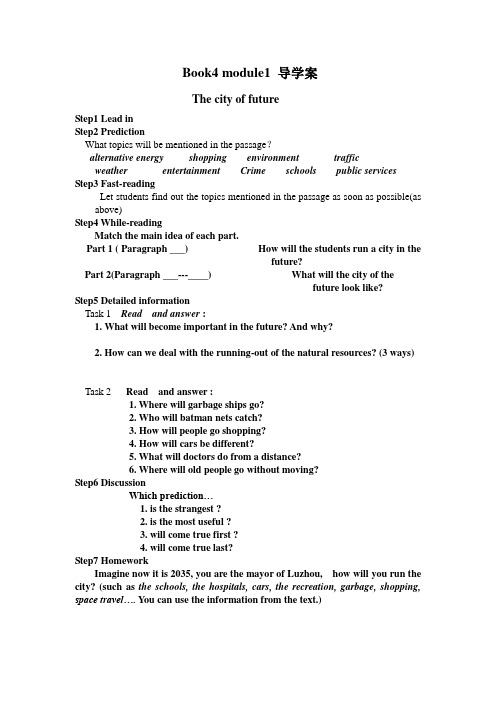
Book4 module1 导学案The city of futureStep1 Lead inStep2 PredictionWhat topics will be mentioned in the passage?alternative energy shopping environment trafficweather entertainment Crime schools public services Step3 Fast-readingLet students find out the topics mentioned in the passage as soon as possible(as above)Step4 While-readingMatch the main idea of each part.Part 1 ( Paragraph ___) How will the students run a city in thefuture?Part 2(Paragraph ___---____) What will the city of thefuture look like?Step5 Detailed informationTask 1 Read and answer :1. What will become important in the future? And why?2. How can we deal with the running-out of the natural resources? (3 ways) Task 2 Read and answer :1. Where will garbage ships go?2. Who will batman nets catch?3. How will people go shopping?4. How will cars be different?5. What will doctors do from a distance?6. Where will old people go without moving?Step6 DiscussionWhich prediction…1. is the strangest ?2. is the most useful ?3. will come true first ?4. will come true last?Step7 HomeworkImagine now it is 2035, you are the mayor of Luzhou, how will you run the city? (such as the schools, the hospitals, cars, the recreation, garbage, shopping, space travel…. You can use the information from the text.)。
B4U1教案

东北师大附中朝阳学校高中教案编号:教师:课题Unit 1 Women of achievement 课型日期教学目标1.Target languagea. Key wordsachieve, achievement, condition, welfare, institute, connection, campaign, organization, specialist, behave, behavior, worthwhile, nest, observe, observation, respect, argue, entertainment, inspire, support, devote ... tob. Key sentencesWatching a family of chimps wake up is our first activity of the day.Everybody sits and waits while the animals in the group begin to wake up and move.But the evening makes it all worthwhile.... we see them go to sleep together in their nest for the night.Only after her mother came to help her for the first few months was she allowed to begin her project.For forty years Jane Goodall has been helping the rest of the world understand and respect the life of these animals.2.Ability goalsa. Learn Warming Up, and know how to tell the great women and the famous women.b. Learn the way to describe a person from what the person did, what she/he looks like 3.Learning ability goalsTeach Ss how to describe a person.教材分析The topic of this unit is “Women of achievement”. It shows the achievement and contributions of six great women in different countries in different times, as well as the problems that they had to overcome. It tells students the importance of respecting and protecting the wildlife. More importantly, it helps the students learns the role that women play in the society and build up their confidence, responsibility and right views of society and gender. It encourages the student to think about their own future plans and how to achieve them. Students should learn to use some adjectives to describe a great person and understand the reading passage. They should also be required to retell the text in their own words. The class aims to develop students different reading abilities and self-confidence, and encourage them to learn from the great women.学情分析At present, nearly half of the students are girl students. Most of them study hard but don’t have high ambition. This article will help them to develop their self-confidence, making them learn from the great women. Meanwhile ,the boy students will also learn to respect the women too.教学重a. By reading A protector of African wildlife, students can learn from Jane Goodall in at least two aspects: one is what is the humane way to study animals; the other is that it was her great personality - universal love and mercy that made her successful. If everyone hadWe all know these meanings of "agree," but when we talk aboutsubject-verb agreement, we're talking about something different: matching subjects and verbs according to number. That is, when you have a singular subject, you have to match it with a singular verb form: The boy plays. When you have a plural subject, you must have a plural verb form: The boys play.In short, simple sentences, you should have no problem with agreement. You can hear the problem: The boys plays. When it's wrong , it just sounds funny. However, there are four potential problem spots that you need to watch carefully:stuff in between the subject and verbreversed sentence order"-body," "-one," and "-thing" words"who," "which," and "that"Stuff in between subjects and verbsThe stuff here is usually a prepositional phrase that separates the subject from the verb. Remember how we crossed out prepositional phrases in order to find the subject? Do the same thing if you're having problems with agreement. Now, thinking about that, look at the following sentence and decide what's wrong with it:The dishes in the kitchen is dirty.Good guess! The subject and the verb don't agree. What's the probable cause for the problem? Kitchen (a singular noun) is right in front of is (a singular verb). If kitchen were the subject, that would be okay. But, it's not. Cross out the prepositional phrase and you're left with:The dishes in the kitchen is dirty."The dishes . . . is dirty?" Sounds wrong, doesn't it? The subject is plural, butthe verb is singular. They don't agree. The correct version is:The dishes in the kitchen are dirty.Once you know how to look for this problem, it shouldn't be too hard to get rid of it when you proofread your paper.Reversed sentence orderThe normal pattern for English sentences is subject-verb. However, there are a few situations where this order is reversed (like this sentence): There are snacks on the laundry-room table.Where are they?On the table are the goodies!See how the subject comes after the verb in each of these? If you can remember how to locate subjects and verbs, you shouldn't blunder into mistakes when writing reversed-order sentences."-body," "-one," and "-thing" wordsThe correct term for these words is indefinite pronouns, but if you remember them as "-body," "-one," and "-thing" words, you'll probably be able to spot them more easily. You only need to know one thing: if a word has one of these endings (like everybody, everyone, anyone, anything, etc.), it is always singular! You can also include each, either, and neither in this group. Look at the following:Everyone is going on a picnic.Each of the boys is taking his own lunch.If anyone drops something to eat, I'll grab it before he can pick it up.You shouldn't have problems with these if you simply memorize the endings of words that are always singular.NOTE: We said that either and neither are always singular; however, if you have two subjects in an “either . . . or” or “neither . . . nor”construction,getting the agreement right may give you fits. To get it right, just locate the subject closest to the verb and make the verb agree with it:Either the mailman or the construction workers are causing Peggy to bark like crazy.Neither the dogs down the street nor the one next door pays any attention. Compare this with the following:Either the construction workers or the mailman is causing Peggy to bark like crazy.Neither the one next door nor the dogs down the street pay any attention. Agreement, in this case, depends on the placement of the subject. "Who," "which," and "that"Remember dependent clauses? They have a subject and a verb, but they can't stand alone. That's what we're dealing with here, but with a little something extra. Now we've got to consider pronouns. A pronoun is a word that takes the place of a noun that comes before it, usually in the same clause or one very close to it.Peggy is a troublemaker. She bites my ears and steals my food. "Who," "which," and "that" are pronouns. When they take the place of a singular noun, they are singular; when they take the place of a plural noun, they are plural. This is important to remember when they are the subject of a clause. Compare the following sentences:Big Dog is one of those animals who are very intelligent.Big Dog is an animal who is very intelligent.In both, who is the subject of a dependent clause. In number 1, it takes the place of animals (a plural form). That's why "are" is the correct verb choice. In number 2, who takes the place of animal (a singular form), and that's why "is" is correct.has)9. Some of the grain __________ to be contaminated. (appear, appears)10. Three-quarters of the students __________ against the tuition hike. (is, are)11. Three-quarters of the student body __________ against the tuition hike. (is, are)12. A high percentage of the population _________ voting for the new school. (is, are)13. A high percentage of the people _________ voting for the new school. (was, were)Period 5-6 Using languageI. Warming upRead aloud to warm up: Let’s warm up by reading aloud to the recording ofthe text WHY NOT CARRY ON HER GOOD WORK.林巧稚----- 中国医学圣母II. Guided readingReading and translatingRead the text WHY NOT CARRY ON HER GOOD WORK and translate it intoChinese paragraph by paragraph. Li Wenqin. You are to do paragraph 1,please. ….Reading and underliningNext you are to read and underline all the useful expressions or collocationsin the passage. Copy them to your notebook after class as homework. Collocations from WHY NOT CARRY ON HER GOOD WORKsit down at the computer, do some res earch on…, enjoy English, choose…to stu university, show information on the screen, be busy in one’s career, travel abroa study, catch the eyes, cut the death rate, have and care for a baby, follow rules,Acting a text playTurn the article A GOOD EXAMPLE FOR ME into a text play. Choose your part and rehearse for the School Art Festival next month.IV. Closing downClosing down by filling a formMake use of the text and others to fill in form.Lin Qiaozhi’s life historytime place eventClosing down by describing a personTo end this period, I am going to have two of you stand up to describe to the class a person whom he admires. Who likes to speak first?Period 7 Exercise教学反思反思之一:抓住时机渗透德育随着国际互联网的普及,人类彼此间的交往越来越方便,越来越频繁。
B4U1过关清单学案

高三一轮英语科课堂复习清单案Book 4 Unit1 Challenge I: 对本单元课标词汇进行词汇链构建,强化巩固,扎实记忆。
1. 成就,功绩n___________ 完成,到达v___________2. 连接,关系n___________ 连接v___________3. 组织,机构,团体n___________ 组织v ___________4. 举止,举动,表现v___________ 行为,举止,习性n___________5. 观察,遵守v___________ 观察,观测n___________6. 辩论,争论v___________ 争论,争辩n ___________7. 鼓舞,启发v___________ 灵感n___________ 鼓舞人心的a___________8. 谈到,参考,查阅v___________ 提及,参考,查阅n___________9. 疾病,恶心n___________ 生病的a ___________10.计划,打算v___________ 打算,目的,意图n ___________11.考虑周到的a___________ 考虑,认为v ___________考虑,体谅n___________ 考虑到prep ___________12.友好的adj____________ 仁慈;好意n ___________Challenge II:对本单元的课标词汇进行分层扩量,夯实基础,能力奠基。
(一)必记单词1.一代;一辈n__________________2.支持;拥护vt&n_______________3.人群观众;挤满vt&n___________4.运动;战役vi&n________________5.递送;接生;生小孩vt___________6.值得的adj___________7.尊敬;敬意vt&n___________8.童年n___________________9.观众;听众n_______________10.阴凉处;荫n____________11.计划;打算vt___________(二)识记单词1.specialist n__________2.emergency n__________3.welfare n___________4.modest adj___________5.project n_____________6.rate n_______________7.nest n___________8.bond n___________9.outspoken adj_________10.career n___________11.institute n _________(三)必记短语1.有…共同之处___________________2.醒来___________________________3.离开,出发,启程________________4.与…交流_______________________5.建立___________________________6.(问题,想法等)涌向心头 ________7.继续,坚持 ____________________ 8.查阅,提到,指的是_______________9.偶然;凑巧_______________________10.过着…的生活 ___________________11.把…奉献给… __________________12.偶遇;碰巧 ___ _13.轻视,看不起____________________Challenge III: 教材与语法填空(第一组)1.I think all of us should mind our __________(behave) in public places.2. Please give my _____________(respect) to your parents.3. The program, which was intended ___________(help) the homeless, was set up.4. If you don’t know the exact meaning of the word, you may refer _____ the dictionary,5. Suddenly ______hit me how difficult it was for a woman to get medical training at that time.6. It is generally believed that there is __________(connect) between smoking and lung cancer.7. The rich man went abroad with the __________ (intend) of trying his fortune.8. Listening to his speech, we were __________(inspire) to make great efforts.9. I hold the firm belief that you are bound to be admitted to a key university, which will give you a wonderful sense of ________________(achieve).10. It was beyond __________(argue) that smoking was harmful to health.(第二组)Nobody before Jane fully understood chimps behaviour. She spent years observing and_ 1________ (record) their daily activities. Since her childhood she had wanted to work with animals in_2_____ own environment. _3__________, this was not easy. When she first arrived in Gombe in 1960, it was unusual for a woman_4________ (live) in the forest. Only her mother came to help her_5_____the first few months was she allowed to begin her project. Her work changed the way people think about chimps. For example, one important thing she discovered is _6_______ chimps hunt and eat meat. Until then everyone had thought chimps ate only fruit and nuts. She actually observed chimps as a group_7_______(hunt) a monkey and then eating_8______ . She also discovered that chimps communicate _9______ each other, and her study of their body language helped her to work _10______ their social system.。
打印版B4U1大课文学案WQ (1)
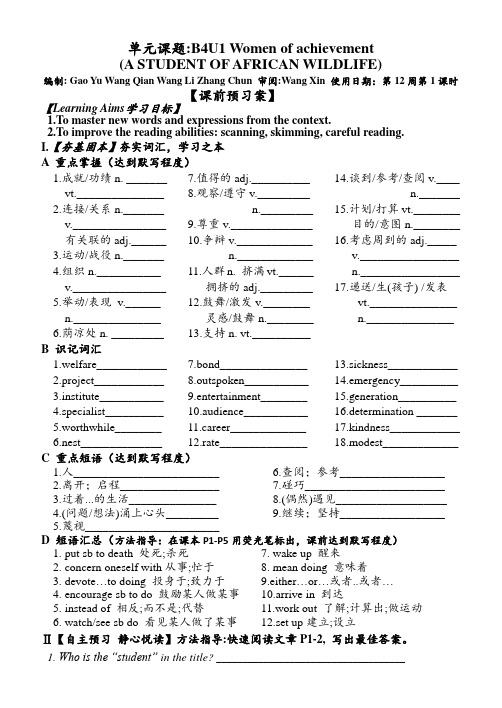
单元课题:B4U1 Women of achievement(A STUDENT OF AFRICAN WILDLIFE)编制: Gao Yu Wang Qian Wang Li Zhang Chun 审阅:Wang Xin 使用日期:第12周第1课时【课前预习案】【Learning Aims学习目标】1.To master new words and expressions from the context.2.To improve the reading abilities: scanning, skimming, careful reading.I.【夯基固本】夯实词汇,学习之本A 重点掌握(达到默写程度)1.成就/功绩n. _______ vt._______________2.连接/关系n._______ v.________________ 有关联的adj.______3.运动/战役n._______4.组织n.___________ v.________________5.举动/表现v.______ n._______________6.荫凉处n. _________7.值得的adj.__________8.观察/遵守v._________n._________9.尊重v.______________10.争辩v._____________n._____________11.人群n. 挤满vt.______拥挤的adj._________12.鼓舞/激发v.________灵感/鼓舞n.________13.支持n. vt.__________14.谈到/参考/查阅v.____n._______15.计划/打算vt.________目的/意图n.________16.考虑周到的adj._____v._________________n._________________17.递送/生(孩子) /发表vt._______________n._______________B 识记词汇1.welfare____________2.project____________3.institute___________4.specialist__________5.worthwhile________6.nest______________7.bond_______________8.outspoken___________9.entertainment________10.audience___________11.career_____________12.rate_______________13.sickness____________14.emergency__________15.generation__________16.determination _______17.kindness____________18.modest_____________C 重点短语(达到默写程度)1.人_________________________2.离开;启程_________________3.过着...的生活_______________4.(问题/想法)涌上心头_________5.蔑视_______________________6.查阅;参考__________________7.碰巧________________________8.(偶然)遇见___________________9.继续;坚持__________________D 短语汇总(方法指导:在课本P1-P5用荧光笔标出,课前达到默写程度)1. put sb to death 处死;杀死2. concern oneself with从事;忙于3. devote…to doing 投身于;致力于4. encourage sb to do 鼓励某人做某事5. instead of 相反;而不是;代替6. watch/see sb do 看见某人做了某事7. wake up 醒来8. mean doing 意味着9.either…or…或者..或者…10.arrive in 到达11.work out 了解;计算出;做运动12.set up建立;设立Ⅱ【自主预习静心悦读】方法指导:快速阅读文章P1-2, 写出最佳答案。
- 1、下载文档前请自行甄别文档内容的完整性,平台不提供额外的编辑、内容补充、找答案等附加服务。
- 2、"仅部分预览"的文档,不可在线预览部分如存在完整性等问题,可反馈申请退款(可完整预览的文档不适用该条件!)。
- 3、如文档侵犯您的权益,请联系客服反馈,我们会尽快为您处理(人工客服工作时间:9:00-18:30)。
Book4 Unit1 导学案
1.achieve vt获得;达到n. achievement (成就;成绩)adj. achievable (可完成的;可达到的)achieve one’s end 达到目的achieve nothing 一事无成
2. condition n.(条件,情况,状况)conditional adj(有条件的;视……而定的)
on condition that...条件是……如果……in (out of) condition 状况好(不好)
make it a condition that...以……under condition of 在……情况下
3. devote vt奉献;贡献devotion n奉献;贡献devotional adj奉献的;虔诚的devote...to...致力于,献身于(to为介词)
4. behave v表现;举止;行为behaviour n行为;举止;态度behave well守规矩behave oneself 举止得体well-behaved 表现良好的badly-behaved 表现差的
5. “be worth +n.(金额,effort,expense等
be (well) worth doing (doing动名词主动形式表被动)
be worthy of being done
be worthy to be done
6.argue v争论;争辩argument n(争论;争辩)argue for 为……
argue against 争辩(反对)argue with sb.同某人争论argue about/over sth.争论某事
argue sb.into doing sth.说服某人做某事argue sb.out of doing sth.说服某人不做某事
Step4.Summing &chewing,summarizing knowledge(总结反刍,知识梳理)
【近义词辨析】
1.argue 和quarrel
The man quarrelled with his wife about children.那个男人与妻子因孩子而吵架。
They argued the plan for a long time.他们就该计划辩论了很长时间。
2.observe 和watch
She has observed the stars all her life. 她一生都在观察星星。
He watched the house for signs of activity.他注视着那所房子里的动静。
3.carry on和carry out
Negotiations were carried on,in spite of the fighting.尽管还在打仗,谈判仍在进行。
We should carry out the policy of our party.我们应当实施党的政策。
He has carried out his promise already. 他已经履行了他的诺言。
4.deliver 和 pass的区别
Would you deliver my message to your elder brother?你可以帮我传口信给你哥哥吗?
The doctor delivered the woman. 医生给这位妇女接生。
5. worthwhile,worthy和worth的区别
The book is well worth reading.这书值得一读。
The place is worthy to be visited/of being visited.这地方值得一游。
It is worthwhile visiting/to visit the place.参观那地方还是很值得的。
6. work out,work at,work on,work for和work off的区别
She finally worked out the difficult maths problem.(算出)
As a senior middle school student, I have been working at my assignments all day.(做,从事)
He is working on a new novel. 他正在写一部新小说。
She works for an engineering company.她在一家工程公司工作。
She worked off her anger by going for a walk.她散散步就消了气。
